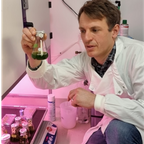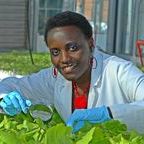Prof. Luke Mackinder
Professor in Plant Biology - Centre for Novel Agricultural Products (CNAP), University of York
Luke is a UKRI Future Leader Fellow and a 2018 SEB Presidents Medallist for Cell Biology. His lab is applying high-throughput, systems and synthetic biology in diverse algae to rapidly dissect, predict and build CO
2 fixing pathways. This data is being used to generate a blueprint for the engineering of efficient CO
2 uptake systems in plants, with the goal of improving photosynthesis and ultimately crop yields and biological based carbon capture systems. Luke did a Marie Curie Funded PhD at the GEOMAR-Helmholtz Centre for Ocean Research Kiel, Germany and the Marine Biological Association of the UK. Followed by a 4-year postdoc at the Carnegie Institute for Plant Sciences, Stanford, before starting his own group at York in 2016. The Mackinder Lab is currently funded by the BBSRC, a BBSRC/NSF-Bio partnership award, EPSRC and the Bill and Melinda Gates Foundation.
:
http://www.mackinderlab.com
:
@mackinderlab








